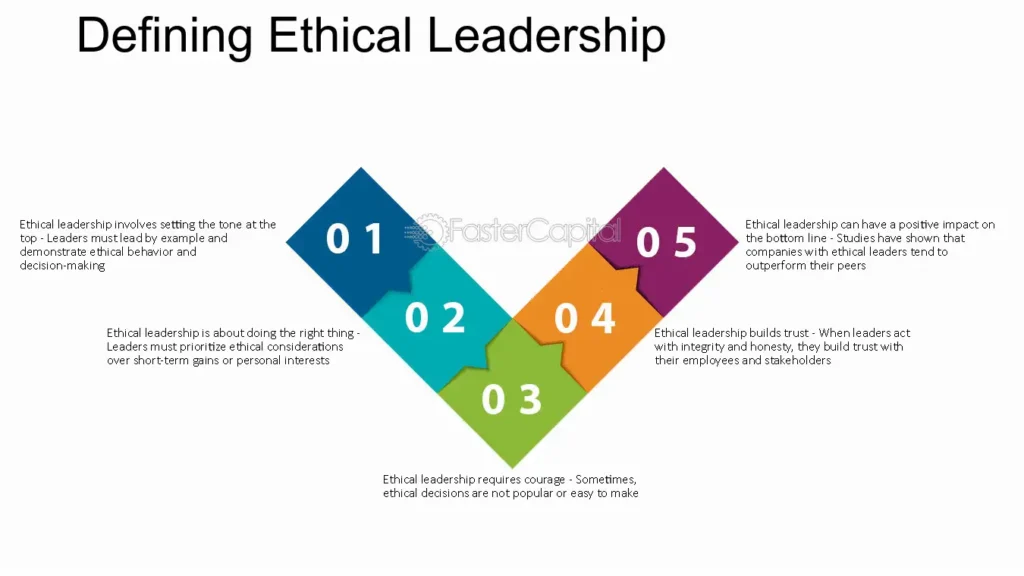In today’s fast-paced and dynamic business environment, the concept of ethical leadership is more important than ever. Leaders who prioritize integrity and ethical conduct not only foster trust and loyalty among their team members but also contribute to the long-term success and sustainability of their organizations. In this article, we delve into the principles of leading with integrity and explore how ethical leadership can drive sustainable business practices.
What is Ethical Leadership?
Ethical leadership is a guiding philosophy that emphasizes the importance of integrity, moral principles, and ethical conduct in the practice of leadership. At its core, ethical leadership involves making decisions and taking actions that are consistent with fundamental principles of fairness, honesty, accountability, and respect for others. Leaders who embody ethical leadership prioritize doing what is right over what is expedient, and they inspire trust, confidence, and loyalty among their followers.
Ethical leaders lead by example, demonstrating integrity and ethical behavior in their interactions with others and in the decisions they make. They adhere to a set of moral values and principles, even when faced with difficult choices or conflicting interests. Ethical leadership is not just about following rules and regulations; it’s about upholding ethical standards and promoting a culture of integrity within organizations.
Key characteristics of ethical leadership include:
- Transparency and Honesty:
Leading with integrity begins with a commitment to transparency and honesty in all dealings. Transparent communication fosters trust and credibility, both internally with team members and externally with stakeholders. Leaders who are open and honest about challenges, opportunities, and decisions demonstrate authenticity and build a culture of accountability within their organizations. - Accountability and Responsibility:
Ethical leaders take ownership of their actions and decisions, accepting accountability for both successes and failures. They hold themselves and others to high standards of conduct, fostering a culture of responsibility and integrity. By demonstrating accountability, leaders inspire trust and confidence among their team members and stakeholders, laying the foundation for sustainable leadership practices. - Respect and Fairness:
Respect for the dignity, rights, and perspectives of all individuals is a cornerstone of ethical leadership. Leaders who prioritize respect and fairness create inclusive and supportive work environments where diversity is valued, and everyone has the opportunity to thrive. By treating others with fairness and empathy, leaders foster a culture of mutual respect and collaboration, driving sustainable organizational performance. - Ethical Decision-Making:
Ethical leaders prioritize ethical considerations in their decision-making processes, weighing the potential impact on stakeholders and society as a whole. They adhere to moral principles and values, even in the face of difficult choices or competing interests. By incorporating ethical perspectives into decision-making, leaders mitigate risks, build reputation capital, and promote long-term sustainability for their organizations. - Social Responsibility and Environmental Stewardship:
Leading with integrity extends beyond the boundaries of the organization to encompass social responsibility and environmental stewardship. Ethical leaders recognize their responsibility to contribute positively to the communities in which they operate and minimize their environmental footprint. By integrating social and environmental considerations into business strategies and operations, leaders demonstrate a commitment to sustainable development and responsible citizenship.

Conclusion
In conclusion, leading with integrity is not only a moral imperative but also a strategic imperative for sustainable leadership. Ethical leaders who prioritize transparency, accountability, respect, fairness, and ethical decision-making foster cultures of trust, innovation, and resilience within their organizations. By upholding ethical principles and values, leaders can drive long-term success and create positive impacts that extend beyond financial performance to encompass social, environmental, and ethical dimensions of sustainability.











